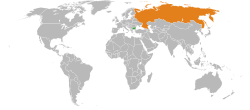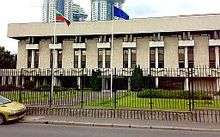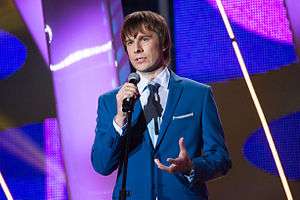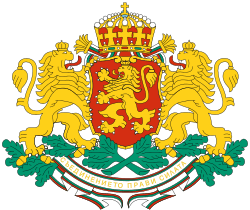Bulgaria–Russia relations
 |
|
Bulgaria |
Russia |
|---|---|

Bulgaria–Russia relations (Bulgarian: Отношения между България и Русия, Russian: Российско-болгарские отношения) are foreign relations between Bulgaria and Russia. Both countries established diplomatic relations on July 7, 1879. Bulgaria has an embassy in Moscow and three consulates general (in Saint Petersburg, Novosibirsk and Yekaterinburg). Russia has an embassy in Sofia and two consulates general (in Ruse and Varna). Both countries are Slavic nations, and are bound together by a common Orthodox culture.
However, in spite of having a good relationship, Bulgaria and Russia still share many different opinions, such as the two World Wars when Bulgaria both joined German side against Russia, and the problem over the history.
Country comparison
| |
| |
|---|---|---|
| Population | 7,364,570 | 143,800,000 |
| Area | 110,994 km2 (42,823 sq mi) | 17,098,242 km2 (6,592,800 sq mi) |
| Population Density | 66.2/km2 (171/sq mi) | 8.4/km2 (21.5/sq mi) |
| Capital City | Sofia | Moscow |
| Government | Unitary parliamentary republic | Federal semi-presidential constitutional republic |
| Current Leader | Rosen Plevneliev | Vladimir Putin |
| Languages | Bulgarian | Russian |
| GDP (nominal) | $54.446 billion ($7,582 per capita) | $2.092 trillion ($14,645 per capita) |
| GDP (PPP) | $106.8 billion ($16,041 per capita) | $2.630 trillion ($18,408 per capita) |
History
19th century-Cold War
The peoples of today modern-day Russia and Bulgaria have had centuries-long interactions, sharing a common heritage. The Cyrillic alphabet originated during 9th century and it was created by Clement and Naum, who were the students of Cyril and Methodius, which later accepted the Orthodox Slavic countries as their standard letter. Relations between Russia and Bulgaria have dated back as far as the 19th century. Both nations had the tradition of calling monarchs tsars, a Slavic word for caesar or emperor. As usual, Russia supported Bulgaria among other Slavic nations in the Balkans simply for the sake of being Slavic aiding them against their enemies(Citation needed). During Russia's wars against the Ottoman Empire (a common enemy among Europeans), especially in the 1877 war, Russia helped Bulgaria gain sovereignty from the Ottoman Empire. The Bulgarians then built the an Orthodox church in Sofia named after the Russian saint Alexander Nevsky in honor of the Russian soldiers who helped Bulgaria during that war. However, during World War I, the Bulgarians joined the side of the Central Powers. During World War II, Bulgaria started as a puppet of the Axis states but as the Soviets invaded the Balkans, Bulgaria joined the Soviet side.
During the Cold War, Yugoslavia emerged as a communist power independent of Soviet control. Rather than joining Yugoslavia, Bulgaria became a Soviet satellite state, the most loyal to the Soviet Union in the Balkans region. Georgi Ivanov, a military officer from Bulgaria became the first Bulgarian into outer space when he boarded Soyuz 33 along with Soviet cosmonaut Nikolai Rukavishnikov. The flight preparation was prepared by Bulgarian scientists as well. During this era, Bulgaria was led by Todor Zhivkov, a close friend of Nikita Khrushchev of the Soviet Union.
After 1989
After the fall of communism in 1989, Bulgarian–Russia relations turned into a new stage. The relations were highly influenced by the type of Bulgarian government - right-wing or left-wing, as the leftist governments were seeking closer ties while right-wing governments were seeking a strictness and correctness of political and economic relations. During communism, Bulgaria was called as one of the 'Soviet satellites' and that type of image was challenging for both new Bulgarian foreign policy and the relations between the two countries. However inspirations of intervening in internal Bulgarian affairs were not lacking and that led to the expulsion of two Russian diplomats during the UDF (СДС) government in March 2001 as Ivan Kostov, then Prime Minister of Bulgaria saw attempts for taking down by the Russian agents of Bulgarian government, only 5 months before the legitimate end of the government term.[1]
Later, the President Georgi Parvanov, elected as a candidate from the BSP party was seeking of large cooperation and many agreements in the area of energetics, which he used to call making of a so-called 'Grand Slam',[2][3] however although he managed with two mandates he was largely lacking public support and later most of the agreements were revised as the successful were given a start but for example NPP Belene was mainly stopped because of the financially unprofitable status of the project for the Bulgarian side. That was not well appreciated by the former Prime Minister and current PES leader Sergei Stanishev who promised for taking down of the right wing government of Boyko Borisov because of it, some experts speculate that the following earlier resignation of the government is not only caused by the BSP pressure but also is not without the involvement of the Russian side.
See also
Bulgarian community of Russia
|
Vlad Yakovlev | |
| Total population | |
|---|---|
| (1,300) | |
| Regions with significant populations | |
| Moscow | |
| Languages | |
| Bulgarian, Russian | |
| Religion | |
| Eastern Orthodox Church and Islamism | |
| Related ethnic groups | |
| Russians, Bulgarians |
References
- ↑ Nikolai Slatinski, National security: aspects, analyses, alternatives, Sofia. 2004 // (Bulgarian) Николай Слатински, “Националната сигурност – аспекти, анализи, алтернативи (doc)”, София, Издателство “Българска книжница”, 2004, p.119
- ↑ We succeed in making the Grand Slam said Parvanov // (Bulgarian) Постигнахме Голям шлем, обяви Първанов. news.bg, 18.01.2008
- ↑ "the so-called "Grand Slam" (three major Bulgarian-Russian energy projects agreed in January 2008 between him and then Russian President Vladimir Putin) has failed to materialize", Bulgaria's Outgoing President Pledges to Help Parties Unite, novinite.com, 17 January 2012
External links
| Wikimedia Commons has media related to Relations of Bulgaria and Russia. |


